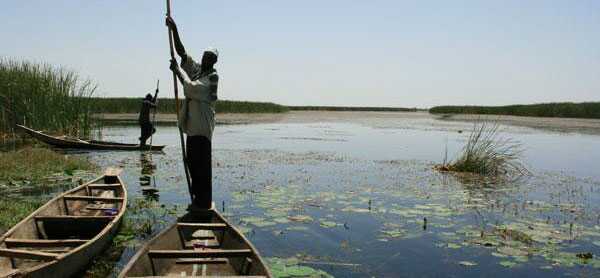Non-state actors, led by the Climate and Sustainable Development Network (CSDevNet), have harped on the need to protect wetlands in Nigeria as the 2022 World Wetlands Day is observed.

The celebration of World Wetlands Day in 2022 is especially significant, as the UN General Assembly adopted Resolution 75/317 on August 30, 2021, establishing February 2 as World Wetlands Day.
The theme for 2022 is “Wetlands Action for People and Nature”, stressing the need for action on ensuring the conservation and sustainable use of wetlands for human and planetary health.
The value of wetlands
Wetlands are significant and valuable components of the ecosystem. They contain fish, reptile species, mammal species, amphibian species, and bird’s species that serve as habitat for man and animal, source of food, shelter and other ecosystem services etc.
Wetlands provide multiple multidimensional services within their environment, such as water purification, supporting natural resources that provide essential human and animal resources.
They also offer multifunctional services such as flood control, water pollution and wastewater treatment, farming activities and providing fishing ground sites with opportunities for fishing and sailing events. Wetlands offer people residing inside and around the buffer zone a chance to improve their livelihood.
However, there are different challenges facing wetlands globally, some of which are pollution, over intensification of agriculture activities, industrialization and urbanisation. Some of the challenges in wetlands are due to the lack of monitoring and sustainability measures from the government and lack of awareness of the inhabitants.
According to Dr Ibrahim Choji, Chair, CSDevNet Board of Trustees, “Wetlands degradation is a serious ongoing problem caused by pollution from oil spills and gas flaring, the population influx attracted by the oil and gas industry, poverty, uncontrolled exploitation of the forest (wood), over-fishing, and various poorly planned infrastructure developments.”
CSDevNet believes that WWD 2022 should serve as a reminder that we are still losing our natural wetland habitat at an alarming rate. Only 13% of the world’s original wetlands are intact now. About 60% have been lost in Asia, 30% in Africa and 7% in Europe and North America.
“Tens of thousands of plants and animals live in or around wetlands. They are the most productive type of natural environment and are home to a large number of human communities. They also help store carbon dioxide, and they help regulate water quality. So, it is very important that we protect them from further destruction. We there join the World to celebrate World Wetlands Day 2022 and raise awareness on the importance of wetlands, their protection, and the conservation of biodiversity,” Dr Choji added.
Wetlands in Nigeria
Nigeria is a country endowed with both freshwater and coastal saline wetlands, covering about 14 wetland belts across the country.
They include the Sokoto-Rima, Komadugu Yobe, Lake Chad, Upper Niger Lake, Kainji Lake, Middle Niger (Lokoja wetlands, Jebba wetlands), Lower Kaduna wetlands, Lower Benue (Makurdi Wetlands), trans boundary wetlands of the Upper Benue and the Cross River.
Others are the Lower Niger, Niger Delta, Benin (Owena River and the Okomu River), Lower Ogun River, Yewa Creeks, Badagry Creeks, Ologe Lagoon Lekki Peninsula and the Lagos Lagoon.
Nigeria has 11 wetlands of international importance (Ramsar Sites). The total area is about 1,076,728 hectares, and the Niger Delta is the largest wetland in Africa and the 3rd largest mangrove forest in the world.
CSDevNet therefore urges all stakeholders to raise a voice for the restoration of wetlands, especially in the Niger-Delta region of Nigeria.
